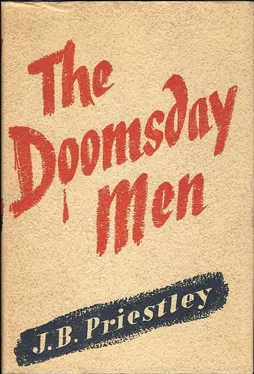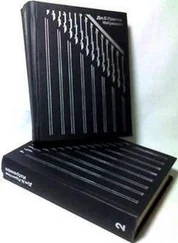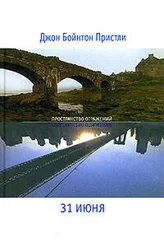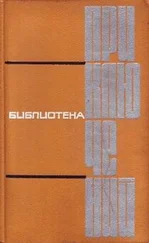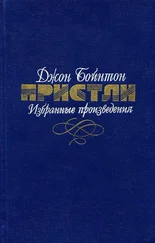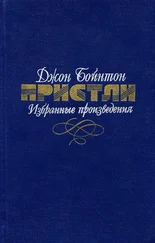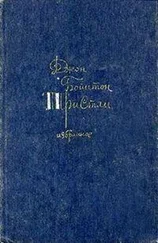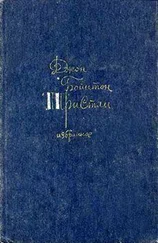Not a light showed at the Old Farm, which revealed itself reluctantly and uncertainly in that queer dusk as an irregular low house, at the end of a wandering drive about three hundred yards from the road. Hooker tried the front door, but it was locked. He had arrived first, as Engelfield had said he might. So he groped his way, past beds of sweet-smelling flowers and tall damp weeds, round to the back, where the door was hard to find. It too was locked. The nearest window, however, was open a little, and Hooker was able to open it still more, to let himself in that way, landing awkwardly on a kitchen table. After that it was easy to find the study upstairs that Engelfield had described, a long low room, all beams and nooks and uneven surfaces. Putting down the bag on the table, a big table with several piles of books on it, some small files, and a great many odd sheets of paper, probably notes, Hooker looked about him comfortably, and decided that though the place was too low and beamy and nooky, had too much furniture in it, too many fusty old things, and the electric light was poor, it would be a good place in which to work, once a fellow had completed all his experiments and had his notes in front of him. For a few minutes he pottered about, opening and looking out of the broad low window in front of the table, and examining some of the bookshelves, which did not look as if they belonged to Engelfield. The scattered sheaves of notes on the table obviously did, however, for familiar symbols and equations caught his eye. Engelfield had distinctly said he could amuse himself, if he had to wait, by trying to decipher these notes. So he wasted no more time, but sat down to them.
They were very tough going, these notes of Engelfield’s. To begin with, Engelfield appeared to have one or two special symbols of his own, and it took the young man about ten minutes to discover what they stood for. The delta symbol could not mean, as it usually did, merely augmentation, for if so the notes did not make sense at all. Then the usual symbol for kinetic energy was missing. Again, some of the notes were meaningless because the formul? in them clearly referred to elements that were represented here by mysterious squiggles that meant nothing to Hooker. It was all very puzzling, but very fascinating too, and soon, here in this rum study in an empty house, far away from anything he had ever known, in mysterious rural England, Hooker was fathoms deep in bewildered speculation, chasing uncertain deuterons and electrons from formula to formula, now as far away from the surface of things outside that Oxfordshire village as if he had been sitting at the bottom of the ocean. There were occasional sounds from outside, sudden voices or passing automobiles, but they meant nothing to him. The point was, what did Engelfield mean? He had to set foot on this new track before the owner of the notes returned, to make him look an ignorant fool. So there he was, completely lost to the world around him, when the door suddenly opened and the place seemed to be full of people.
Actually, there were three: the large grim brother Henry, wearing a light overcoat, and two hefty middle-aged men in blue uniform, obviously policemen. The one in front with Henry looked a sort of inspector, and the one at the back, standing just inside the door, an ordinary constable.
“Now then!” said the inspector, sharply.
Hooker looked up, grinned vaguely, then stood up. “Hello!” he cried cheerfully, mostly to Henry.
But Henry did not respond. “You see,” he said to the inspector. Then he turned again. “And look-there’s the very bag.” And he stepped forward, held up the bag, suddenly and unaccountably opened it, and with a dramatic gesture spilt some of its contents on the table. Valuable metal shone there: little gold cases, silver-backed hairbrushes, and the like. No wonder, Hooker thought, the bag had seemed so heavy. But what was all this about?
The inspector, who had a very long and reddish nose, looked pleased. “Caught him right on the job, sir,” he observed, mysteriously.
“What’s the idea?” asked Hooker pleasantly.
This appeared to amuse the policeman. The one at the back suddenly guffawed. The inspector’s nose came down to split a wide grin.
“They’re all the same,” he said, still grinning, to the grim Henry. “Catch ’em right on the job, with the stuff in their ’ands, and they ask you what the idear is. English, American-all alike-it seems. Can you beat it? Now,” he said, turning sternly on the bewildered young man, “I’ll tell you what the idear is, my lad. You’re caught, fairly caught, not only ’ouse-breaking, but with stolen goods in your possession- if I might call your attention to them things on the table.”
“Here, wait a minute,” Hooker shouted, suddenly finding himself in a lunatic world, “I was invited here, and that bag was given to me to bring down here.”
“Oh? And who gave it to you?”
“He did.” And Hooker pointed to Engelfield’s brother, coolly standing there.
“I did?” The unspeakable Henry coolly laughed.
“We don’t want any lip,” said the inspector sternly to the amazed young man. “Must think we’re fools. Invited here!”
“And so I was. By his brother.”
“And that’s why you climbed into an empty house by the kitchen window, eh? Come off it, lad. You’re doing yourself no good, trying to brazen it out this fashion.”
“But I tell you,” Hooker shouted, “I was with them yesterday, at the Savoy Hotel-”
“You were at the Savoy Hotel all right,” said the inspector, with satisfaction. “We know all about that. And a nice bagful you got too.”
“And they asked me to come here to-night-”
“Just a minute, inspector,” said Henry, as the policeman was about to interrupt. “We can soon settle this. I don’t know you-but you say you know me, eh?”
“Of course I do.”
“Well, what’s my name then?”
“Henry-”
“Yes-but what?”
“Well-” said Hooker desperately, “Engelfield, I guess.”
“You see,” the other said calmly to the inspector. “Claims he knows me and doesn’t even know my name.”
“Oh-you needn’t tell me, sir,” replied the inspector. “It’s as clear a case as ever I saw.”
This was the moment when Hooker came to life again. So far he had been like a man struggling to overcome some nightmare growth in the world about him. If he looked at these crazy events hard enough, he had felt that they would turn ordinary and sensible again. As if he had invented this new Henry and the policemen. But now it was as if he suddenly realised that they were outside himself, actual, and menacing. He must do something, and immediately. In another minute these two beefy cops would be marching him off somewhere. They had no real case; the frame-up was monstrous enough to be almost childish; but he could not help feeling that once he was marched off, it might take him weeks, possibly months, to clear himself; and even at that there would be some people at the Institute telling each other that Hooker must have been behaving queerly, that there’s no smoke without fire, and all the rest of it. He had no idea what happened to you here in England when the police laid hands on you-something very leisurely, he imagined-but whatever it was, it must not happen to him. Something had to be done-quick.
He was standing close to the table, the narrow side, not far from the open window. The inspector and Engelfield’s damnable brother were standing together, about three yards away, with most of the table between them and him and the window. The ordinary policeman was still just inside the doorway. Hooker was long and lean, but no weed; in fact, very active and quite strong; and it was only a few years since he had been one of the star men in his college basket-ball team. And when it was required of him, he could both think and act very quickly.
Читать дальше
